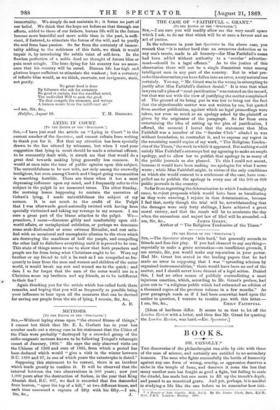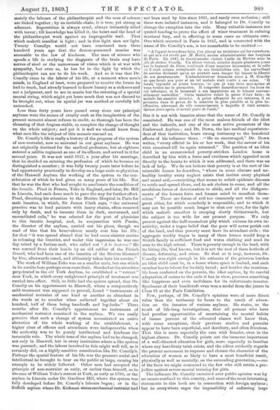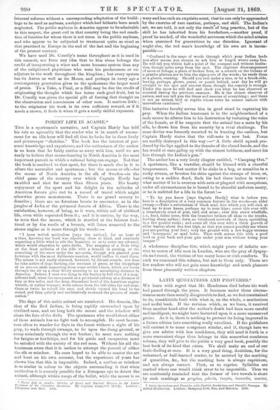BOOKS.
DR. CON OLLY.*
THE discoveries of the philanthropist run side by side with those of the man of science, and certainly are entitled to no secondary honours. The man who fights successfully the battle of humanity against any one form of wrong, cruelty, or oppression deserves a niche in the temple of fame, and deserves it none the less that many another man has fought as good a fight, but failing to scale the citadel, has made but one more to fill up the trench's depth, and passed to an unnoticed grave. And yet, perhaps, it is needful in studying a life like the one before us to remember how inti-
James Clark, Bart., S.C.B.,
• .1 Memoir of John Conolly, M.D., D.C.L. By Sir
mately the labours of the philanthropist and the man of science are linked together ; by an invisible chain, it is true, yet strong as adamant. Superstition ie always cruel, always intimately allied with terror ; till knowledge has killed it, the heart and the head of the philanthropist work against an impregnable wall. That which maketh manifest is light ; and in this light men see light. Twenty Conollys would not have convinced men three hundred years ago that the demon-possessed maniac was amenable to the law of kindness. The man of science who spends a life in studying the diagnosis of the brain may have nerves of steel or the narrowness of vision which is at war with sympathy, but even so, he has let in the light by which the philanthopist can see to do his work. And so it was that Dr.
Conolly came to the labour of his life, at a moment when men's minds, in England at least, were prepared to receive the lesson he had to teach, had already learned to know lunacy as a sickness and not a judgment, and to see in mania but the untuning of a special mental string, which might yet leave much that was not discord to be brought out, when its special jar was soothed or carefully left untouched.
Less than forty years have passed away since our principal asylums were the scenes of cruelty such as the imagination of the present moment almost refuses to credit, so thorough has been the cleansing of that Augean stable, so complete the change of thought on the whole subject; and yet it is well we •should know from what men like the subject of this memoir rescued us.
Dr. Conolly's life is really a history of the progress of the system of non-restraint, now so universal in our great asylums. He was not originally destined for the medical profession, but at eighteen entered a militia regiment as one of its officers, and served in it for several years. It was not until 1817, a year after his marriage, that he decided on entering the profession of which he became so distinguished a member ; it was fully twenty years later before he had opportunity practically to develop on a large scale as physician of the Hanwell Asylum the working of the system to the con- sideration of which he had given so many years of his life. Not that he was the first who had sought to ameliorate the condition of the lunatic. Pinel in France, Tuke in England, and later, Dr. Hill in Lincoln, had each done much to pave the way for further effort. Pinel, directing his attention to the Bicotre Hospital in Paris for male lunatics, in which, Sir James Clark says, " the universal practice was to load patients with heavy chains, often removed only by death, and to immure them in dark, unwarmed, and unventilated cells," he was selected for the post of physician to this lunatic hospital, and, in conjunction with Pussin, the director of the asylum, carried out his plans, though we read of him that his benevolence nearly cost him his life ; for that "it was spread abroad that he had some sinister motive in releasing the lunatics, and under this impression he was one day seized by a furious mob, who called out A la lantern!' He was rescued from their hands by an old soldier of the French Guard, who had been one of the lunatics of the Bicetre liberated by him, afterwards cured, and ultimately taken into his service."
The work of William Tuke was on a smaller scale, but one which in its results bore perhaps even more fruit. Shocked at the atrocities perpetrated in the old York Asylum, he established a " retreat " near York, in which every enlightened principle of treatment was carried into effect. Still, so little had the system spread, that Dr. Conolly on his appointment to Hanwell, where a comparatively mild treatment was supposed to prevail, found " instruments of mechanical restraint of one kind or another so abundant in the wards as to number when collected together about six hundred, half of them being handcuffs and leg-locks." Three months after Dr. Conolly's appointment no instrument of mechanical restraint remained in the asylum. We can easily perceive that such a change of system necessitated an entire alteration of the whole working of the establishment, a higher class of officers and attendants were indispensable when the authority was to be purely intellectual and kindness the invariable rule. The whole tone of the asylum had to be changed, not only in Hanwell, but in every institution where a like system was pursued ; and the labour involved in this might well tell, as it certainly did, on a highly sensitive constitution like Dr. Conolly's. Perhaps the special feature of his life was the pressure social and intellectual he brought to bear on the public at large, causing his example to be widely followed. Other men had accepted the principle of non-restraint as early, or earlier than himself, as in the case of William Tuke's retreat at York, as early as 1796, or the asylum in Lincoln under Dr. Gardiner Hill, where the system was fully developed before Dr. Conolly's labours began ; or in the Suffolk asylum where Dr. Kirkman states mechanical restraint had
not been used by him since 1831, and rarely even seclusion ; still these were isolated instances, and it belonged to Dr. Conolly to change the exception into the rule. Many valuable instances are quoted tending to prove the effect of wiser treatment in calming maniacal fury, and in effecting in some cases an ultimate cure. One which occurred in Paris in 1847, and is connected with the name of Dr. Conolly's sun, is too remarkable to be omitted :-
" A l'appui de ces deux faits, j'en citerai un troisieme qui lea corrobore, et qui m'a eta rdvdle par if. Battel, ancien administrateur des hospices de Paris. En 1847, ce fonctionnaire visitait l'asile de Biatre avec is file du docteur Conolly. "fin ahead violent, attachd depuis pinsienrs jours sur le fauteuil de force, vocifdrait d'une maniere incessant°, et la salle oh it dtait retenu retontissait de sos formidables erie. Le surveillant de service ddclarait qu'on ne pouvait sans danger lui hisser is libertd de ses mouvements. L'administratenr demands alors it M. Conolly ce qua ferait son pdre si nn tel malade dtait confid a sea soins. ' 11 ferait,' rdpondit co jeuno homme, ' co qua je vats faire moi-memo si vous voulez mo le permettre. II couperait immediatement lea liens de cet infortund, et le laisserait Il sea impulsions en le faisant conven-
ablement Cette tentative valait la peine d'être faits ; le malade fut aussitot ddtachd. A pains affrtuichi de sos entraves, it se promena dans le preen do la maniere is plus paisible et la plus in- offensive, adressant de vita remerciments h laquelle 11 dtait soumis. Quinze fours apres, it sortait guiri de l'asile."
But it is not with lunatics alone that the name of Dr. Conolly is associated. He was one of the most zealous friends of the idiot and the imbecile, and one of the moat active promoters of the Earlawood Asylum ; and Dr. Down, the late medical superinten- dent of that institution, bears strong testimony to the beneficial effects of his influence there. "He so encouraged," Dr. Down writes, " every official in his or her work, that the savour of his visit remained till he agaiu returned." The position of an idiot child in an overcrowded poverty-stricken London home is described by him with a force and vividness which appealed most directly to the hearts to which it was addressed, and there was no lack of help. We do not believe that poverty is at the root of the miserable homes he describes, " where iu some obscure and un- healthy locality every neglect exists that invites every physical and moral evil,—everything that seems to solicit epidemic diseases to settle and spread there, and to ask cholera to come, and all the scrofulous forms of deterioration to abide, and all the disfigure- ments of the human form and human mind to manifest them- selves." These are forms of evil too commonly met with in our great cities, for which somebody is responsible, and to which it may not be possible much longer to shut our eyes, for the light which maketh manifest is creeping slowly thitherwards, but the subject is too wide for our present purpose. We only protest against the half-somnolent pity which excuses its own in- activity, under a vague belief that the poor will never perish out of the laud, and that poverty must have its attendant evils ; the aggregate weekly wages in many of these homes would keep a Scotch family in sufficient food and warm clothing and send its sons to the high school. There is poverty enough in the land, with its biting ills, God knows, but it is not the root of these hotbeds of disease, deformity, and crime. Be that as it may, however, Dr. Conolly was right enough in his estimate of the grievous burden an idiot child must be, in a home where space is limited, and each member has to labour for its daily bread ; and besides the inestima- ble boon conferred on the parents, the idiot asylum, by its careful adaptation of means to the ends it has in view, procures something like happiness and even usefulness for its unfortunate inmates. Specimens of their handicraft even won a medal from the jurors in Class 91 at the Paris Exhibition.
Few, perhaps, of Dr. Conolly's opinions were of more direct value than the testimony he bears to the result of educa- tion on the inmates of various asylums. He states, as the result of life-long investigations, that all persona who have had peculiar opportunities of ascertaining the mental habits of insane persons of the educated classes well know that, with some exceptions, their previous studies and pursuits appear to have been superficial, and desultory, and often frivolous. That this is more especially the case with females, even in the highest classes. Dr. Conolly points out the immense importance of a well-directed education for girls, more especially in families where any hereditary taint exists, and the editor evidently regards the present movement to improve and elevate the character of the education of women as likely to have a most beneficial result, physically as well as mentally, on the succeeding generation,—one of the facts we might commend to the few who still retain a pre- judice against severe mental training for girls.
The influence Dr. Conolly exercised over public opinion was by no means confined to this country, and some of the most interesting statements in this book are in connection with foreign asylums ; but he everywhere urges the impossibility of enforcing large internal reforms without a corresponding adaptation of the build- ings to be used as asylums, a subject which had hitherto been much neglected. The public asylums in America appear to be admirable in this respect, the great evil in that country being the sad condi- tion of lunatics for whom there is not room in the public asylums, and who appear to be subjected to treatment quite as cruel as that practised in Europe in the end of the last and the beginning of the present century.
We have used Dr. Conolly's name throughout as it is used in this memoir, not from any idea that to him alone belongs the credit of inaugurating a wiser and more humane system than any of the enlightened physicians who were his predecessors or co- adjutors in the work throughout the kingdom ; but every system has its Aaron as well as its Moses, and perhaps in every age a contemporary generation gives to the spokesman the larger meed of praise. To a Take, a Pinel, or a Hill may be due the credit of originating the thought which has borne such good fruit, but to Dr. Conolly was given the special gift of forcing that thought on the observation and consciences of other men. It matters little ; to the originator his work is its own sufficient reward, or if it needs a crown, it finds it when it gets a really skilful exponent.
































 Previous page
Previous page